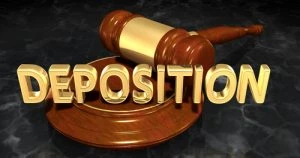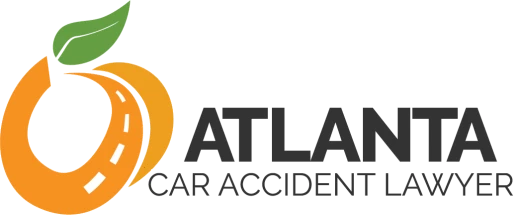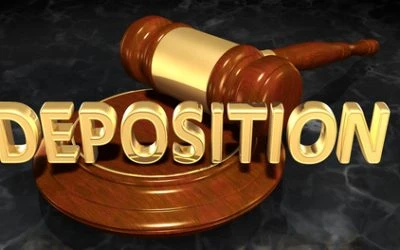
A deposition hearing can be the most important event that happens during a case. In a personal injury lawsuit, the deposition is used as a tool during the “discovery” process before a trial to gather evidence and vital information. If you’re wondering “what is a deposition hearing, exactly?” this article will cover the basics and what to expect to happen during the hearing.
What Is a Deposition Hearing?
Deposition hearings are question and answer sessions where a witness gives testimony in response to questions from an attorney. The purpose of a deposition is to learn more about the case.
Depositions are usually quite simple events, but they can be very beneficial for you and your personal injury lawyer. After you’ve filed a lawsuit against the at-fault party and before a trial or settlement happens, there is a discovery phase to gather information. This is typically when the deposition happens.
Many witnesses won’t voluntarily come to a deposition, but they can be compelled to attend a deposition through a subpoena—a summon ordering them to appear and give testimony.
What Happens During the Deposition?
During a deposition hearing, sworn testimony is given under oath. The person who is being deposed, or questioned (also known as a deponent), must appear for the hearing at a certain time and place. A court reporter is usually present to record the hearing and create a written transcript that may be used in trial.
Like during a trial, in a deposition hearing a lawyer will ask the deponent questions. First, there is an examination by one attorney. This is followed by a cross-examination by the other attorney. The second attorney can object during questioning by the first attorney. However, no judge is present to rule on objections like in a trial. If an objection is made, it’s recorded but the questioning usually doesn’t stop.
In a car accident case where you’re the victim, for example, a deposition will cover three main topics:
- Your personal background—including name, address, date of birth, telephone number, your educational background, your health and medical background, and employment history.
- How the accident occurred—including the date, time, location, weather and traffic conditions, what each driver did and when, and any other specific details about the car accident.
- Your car accident injuries—including how they happened, how severe they are, what your symptoms are, time missed from work, and your medical treatment so far.
It’s important to always remain calm during a deposition hearing, not showing frustration or anger, and to tell the truth. You should also remember the opposing counsel is not your friend. Their purpose is to win in court, so they will be looking for facts or information they can use against you. However, don’t let this frighten or unnerve you. Your car accident lawyer can help you prepare for the deposition so you remain calm and confident in your stance.
Why Deposition Hearings Are Used in Personal Injury Cases
There are a number of reasons a deposition hearing is called, including:
- To gain information about the strengths and weaknesses of the case
- To gather information facts in the case
- To determine when and how the injury happened
- To see how the opposing party will testify in trial
Your lawyer will seek information during a deposition hearing to help your case. They will also craft questions carefully related to the facts of your case and claims made in the lawsuit. While you might feel nervous about what happens at a deposition for a car accident, your attorney will help you feel prepared. In a personal injury case where you’re suing for damages from your injury, you’ll want to prove that the other party was acting negligent. So, your lawyer may choose to depose the person responsible for the injury.
Schedule a Legal Consultation with a Lawyer for Free
Deposition hearings can be especially vital in a car accident or other personal injury case. Our car accident attorneys are well-versed in the deposition process and know how to use it for the most benefit in pursuing financial recovery for you. If you’re dealing with an injury that wasn’t your fault and are seeking recovery for your costs, our lawyers can help. Give us a call today for a FREE consultation to go over your options. Call (404) 341-6555, or fill out the form to the right for your free consultation.



